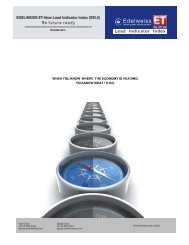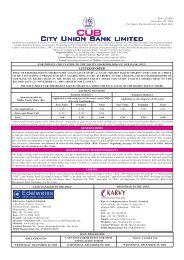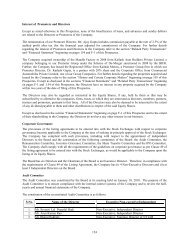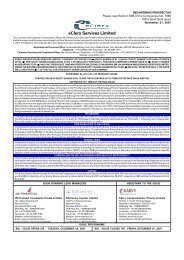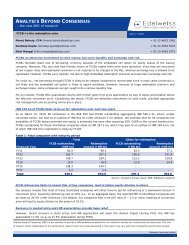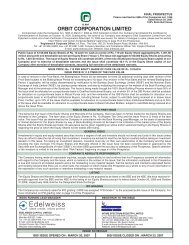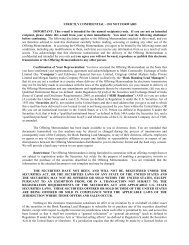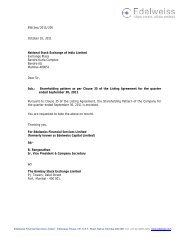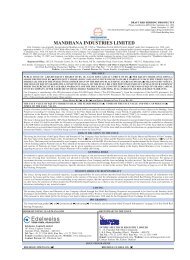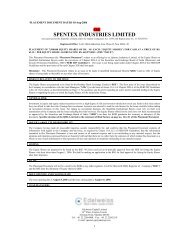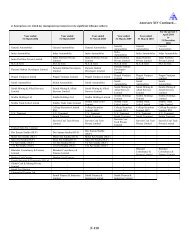eXtensible Business Reporting Language - Edelweiss
eXtensible Business Reporting Language - Edelweiss
eXtensible Business Reporting Language - Edelweiss
Create successful ePaper yourself
Turn your PDF publications into a flip-book with our unique Google optimized e-Paper software.
XBRL<br />
<strong>eXtensible</strong> <strong>Business</strong><br />
<strong>Reporting</strong> <strong>Language</strong><br />
The Future of Financial <strong>Reporting</strong><br />
February 3, 2011<br />
Ram Iyer
Contents<br />
1<br />
XBRL- Background<br />
2<br />
Advantages of XBRL<br />
3<br />
How KPMG can help<br />
© 2011 KPMG, an Indian Partnership and a member firm of the KPMG network of<br />
independent member firms affiliated with KPMG International Cooperative (“KPMG<br />
International”), a Swiss entity. All rights reserved.<br />
1<br />
1
1.<br />
XBRL- Background<br />
2
What is XBRL<br />
© 2011 KPMG, an Indian Partnership and a member firm of the KPMG network of<br />
independent member firms affiliated with KPMG International Cooperative (“KPMG<br />
International”), a Swiss entity. All rights reserved.<br />
•3
Analysing Data – The Old Way<br />
ABC Ltd<br />
Financial Statements<br />
XYZ Ltd<br />
Financial Statements<br />
.doc / .xls /<br />
.ppt / html/pdf<br />
© 2011 KPMG, an Indian Partnership and a member firm of the KPMG network of<br />
independent member firms affiliated with KPMG International Cooperative (“KPMG<br />
International”), a Swiss entity. All rights reserved.<br />
4
Analysing Data – The XBRL Way!<br />
User’s Software<br />
ABC<br />
Financial Statements<br />
XBRL file<br />
XYZ<br />
Financial Statements<br />
.doc / .xls /<br />
.ppt / html/pdf<br />
© 2011 KPMG, an Indian Partnership and a member firm of the KPMG network of<br />
independent member firms affiliated with KPMG International Cooperative (“KPMG<br />
International”), a Swiss entity. All rights reserved.<br />
5
Introduction to XBRL (<strong>eXtensible</strong> <strong>Business</strong> <strong>Reporting</strong> <strong>Language</strong>)<br />
• Bar code<br />
• Computer language<br />
• Member of XML language family<br />
• Extensible<br />
• Enables reading of documents<br />
• Innovation<br />
• Tagging<br />
• Taxonomies<br />
© 2011 KPMG, an Indian Partnership and a member firm of the KPMG network of<br />
independent member firms affiliated with KPMG International Cooperative (“KPMG<br />
International”), a Swiss entity. All rights reserved.<br />
6
How it Works (1)<br />
7<br />
© 2011 KPMG, an Indian Partnership and a member firm of the KPMG network of<br />
independent member firms affiliated with KPMG International Cooperative (“KPMG<br />
International”), a Swiss entity. All rights reserved.
How it Works (2)<br />
8<br />
© 2011 KPMG, an Indian Partnership and a member firm of the KPMG network of<br />
independent member firms affiliated with KPMG International Cooperative (“KPMG<br />
International”), a Swiss entity. All rights reserved.
How it Works (3)<br />
9<br />
© 2011 KPMG, an Indian Partnership and a member firm of the KPMG network of<br />
independent member firms affiliated with KPMG International Cooperative (“KPMG<br />
International”), a Swiss entity. All rights reserved.
How it Works (4)<br />
10<br />
© 2011 KPMG, an Indian Partnership and a member firm of the KPMG network of<br />
independent member firms affiliated with KPMG International Cooperative (“KPMG<br />
International”), a Swiss entity. All rights reserved.
How XBRL Helps<br />
• Compiling, storing, using data<br />
• Can change language labels<br />
• Transferring data (apps, locations)<br />
• Computer, mobile, blackberry, tablet<br />
• Financial data<br />
• Non-financial data<br />
© 2011 KPMG, an Indian Partnership and a member firm of the KPMG network of<br />
independent member firms affiliated with KPMG International Cooperative (“KPMG<br />
International”), a Swiss entity. All rights reserved.<br />
11
Potential Uses (Examples)<br />
Supplier Data<br />
Regulatory Filings<br />
Forms<br />
Customer Data<br />
Financial Statements<br />
Project Info<br />
Employee Data<br />
MIS / Budgets<br />
© 2011 KPMG, an Indian Partnership and a member firm of the KPMG network of<br />
independent member firms affiliated with KPMG International Cooperative (“KPMG<br />
International”), a Swiss entity. All rights reserved.<br />
12
The Mechanics<br />
© 2011 KPMG, an Indian Partnership and a member firm of the KPMG network of<br />
independent member firms affiliated with KPMG International Cooperative (“KPMG<br />
International”), a Swiss entity. All rights reserved.<br />
13
What the Preparer Needs<br />
1.<br />
Taxonomy<br />
Extension Taxonomy /<br />
Coding expertise 2.<br />
3.<br />
Engine / Tool<br />
© 2011 KPMG, an Indian Partnership and a member firm of the KPMG network of<br />
independent member firms affiliated with KPMG International Cooperative (“KPMG<br />
International”), a Swiss entity. All rights reserved.<br />
14
Example of Taxonomy – Plain English<br />
© 2011 KPMG, an Indian Partnership and a member firm of the KPMG network of<br />
independent member firms affiliated with KPMG International Cooperative (“KPMG<br />
International”), a Swiss entity. All rights reserved.<br />
15
Example of Taxonomy - xml<br />
© 2011 KPMG, an Indian Partnership and a member firm of the KPMG network of<br />
independent member firms affiliated with KPMG International Cooperative (“KPMG<br />
International”), a Swiss entity. All rights reserved.<br />
16
History of XBRL<br />
1<br />
No fee for using<br />
2<br />
Developed and maintained by not-for-profit organization called XBRL<br />
International<br />
3<br />
Created in 1999 with funding from AICPA<br />
4<br />
Hundreds of members like accounting firms, businesses, regulators,<br />
accounting standard setters<br />
5<br />
Recognizes “jurisdictions”<br />
© 2011 KPMG, an Indian Partnership and a member firm of the KPMG network of<br />
independent member firms affiliated with KPMG International Cooperative (“KPMG<br />
International”), a Swiss entity. All rights reserved.<br />
17
Global Scene<br />
• Several countries have already mandated XBRL-based filing of financial statements.<br />
• In Israel, all public companies are mandatorily required to do their filing using XBRL-based<br />
interface called MAGNA.<br />
• In Japan, beginning financial year 2008-09, approximately 5,000 companies and 3,000 investment<br />
funds are compulsorily required to do their filings using XBRL-based EDINET system.<br />
• USA has already mandated XBRL-based filing for its top 500 companies effective June 2009. By<br />
the middle of 2012, all domestic and foreign companies that are publicly traded in the United<br />
States are required to provide their SEC filings using the XBRL format beginning with simple<br />
block tagging but progressing to more complex detail tagging of financial information including<br />
footnotes and schedules.<br />
• Similarly, in China, Singapore, Germany, Italy, Korea, India, etc., XBRL filing is currently<br />
mandatory for certain select companies.<br />
© 2011 KPMG, an Indian Partnership and a member firm of the KPMG network of<br />
independent member firms affiliated with KPMG International Cooperative (“KPMG<br />
International”), a Swiss entity. All rights reserved.<br />
18
Indian Scene<br />
• XBRL India is a provisional jurisdiction of the XBRL International created by The Institute of<br />
Chartered Accountants of India (ICAI) to spearhead the promotion and adoption of XBRL in India.<br />
• Members of XBRL India include the premier organisations like Reserve Bank of India (RBI),<br />
Securities and Exchange Board of India (SEBI), Ministry of Corporate Affairs (MCA), Bombay Stock<br />
Exchange Limited (BSE), National Stock Exchange of India Limited (NSE), Insurance Regulatory<br />
and Development Authority (IRDA).<br />
• XBRL India (under ICAI leadership) has developed an Indian GAAP Taxonomy.<br />
• Exposure draft of a banking taxonomy complying with Basel-II <strong>Reporting</strong> Requirements was also<br />
published a few months back and, further, it has received acknowledged status from the XBRL<br />
International.<br />
• Taxonomy for non-banking financial companies is also in the offing.<br />
• Optional filing notified by NSE.<br />
• Certain RBI forms mandatory.<br />
• Several organizations have adopted XBRL.<br />
© 2011 KPMG, an Indian Partnership and a member firm of the KPMG network of<br />
independent member firms affiliated with KPMG International Cooperative (“KPMG<br />
International”), a Swiss entity. All rights reserved.<br />
19
Regulatory development - India<br />
SEBI<br />
• Filing of specified information by listed companies through XBRL enabled technology viz. the<br />
Corporate Filing and Dissemination System (CFDS)<br />
Stock exchanges<br />
• The BSE and NSE, have already adopted an XBRL-based reporting system under a unified<br />
electronic platform popularly known as the ‘CorpFiling’ system.<br />
• Currently, the top 100 companies in India are using ‘CorpFiling’ to submit their disclosures to the<br />
two exchanges.<br />
Ministry of Corporate Affairs<br />
• Project MCA-21 using XBRL targets to create an information sharing platform with regulators and<br />
ministries to provide an early warning system for the ministry.<br />
• The MCA, has resolved to implement XBRL for all companies in India from 2011.<br />
© 2011 KPMG, an Indian Partnership and a member firm of the KPMG network of<br />
independent member firms affiliated with KPMG International Cooperative (“KPMG<br />
International”), a Swiss entity. All rights reserved.<br />
20
Preparing for XBRL<br />
Roll-out<br />
Convert to<br />
XBRL<br />
Inventory of<br />
Data-Gathering/<br />
Collation Activities<br />
Getting the<br />
best out of<br />
XBRL<br />
Standardize the<br />
Information<br />
Identify<br />
XBRL<br />
Opportunities<br />
Plan the Project<br />
© 2011 KPMG, an Indian Partnership and a member firm of the KPMG network of<br />
independent member firms affiliated with KPMG International Cooperative (“KPMG<br />
International”), a Swiss entity. All rights reserved.<br />
•21
Further Information- useful websites for XBRL<br />
Xbrl.us<br />
Xbrl.org<br />
Xbrl.org/in<br />
Several other websites/books<br />
© 2011 KPMG, an Indian Partnership and a member firm of the KPMG network of<br />
independent member firms affiliated with KPMG International Cooperative (“KPMG<br />
International”), a Swiss entity. All rights reserved.<br />
22
2.<br />
Advantages of XBRL<br />
23
Advantages of XBRL<br />
Key advantages of XBRL include:<br />
• Transparent filing of financial statements;<br />
• Universally-accepted data format;<br />
• Efficient and timely transfer of data;<br />
• Quick and easy analysis of financial data, both internally and across companies;<br />
• Improved monitoring by regulators, viz. SEBI, RBI, MCA, Stock Exchanges, etc.;<br />
• Easier detection of errors and inconsistencies;<br />
• Significant cost reduction in data collection and data analyses;<br />
• Increased accuracy of financial data;<br />
• Improved performance measurement, cost accounting and decision making;<br />
• Globalization of financial and business data;<br />
• Global sharing of resources;<br />
• Easier and more efficient financial analysis by auditors;<br />
• Real time reporting and validation of data.<br />
© 2011 KPMG, an Indian Partnership and a member firm of the KPMG network of<br />
independent member firms affiliated with KPMG International Cooperative (“KPMG<br />
International”), a Swiss entity. All rights reserved.<br />
24
3.<br />
How KPMG can help.<br />
25
How KPMG can help-The Need<br />
Some of the key challenges that the Corporates might encounter in its financial reporting process<br />
are:<br />
• Availability of adequate and appropriate skilled<br />
resources to meet the financial reporting<br />
deadlines specifically at period ends.<br />
• Smooth and timely closure of reporting.<br />
• Highly volatile and complex IFRS literature having<br />
an impact on the taxonomies.<br />
• Requirement of training the human resources to<br />
keep pace with XBRL and its finer details.<br />
• The software/tool to be used for the purpose of<br />
tagging the financials.<br />
© 2011 KPMG, an Indian Partnership and a member firm of the KPMG network of<br />
independent member firms affiliated with KPMG International Cooperative (“KPMG<br />
International”), a Swiss entity. All rights reserved.<br />
26
Thank You<br />
Ram Iyer<br />
Director<br />
Accounting Advisory Services<br />
KPMG in India<br />
Phone: +91 (22) 30901946<br />
Email: rgiyer@kpmg.com<br />
© 2011 KPMG, an Indian Partnership and a member firm of the KPMG network of independent member firms affiliated with KPMG International Cooperative (“KPMG<br />
International”), a Swiss entity. All rights reserved.<br />
The KPMG name, logo and "cutting through complexity" are registered trademarks or trademarks of KPMG International Cooperative ("KPMG International").




